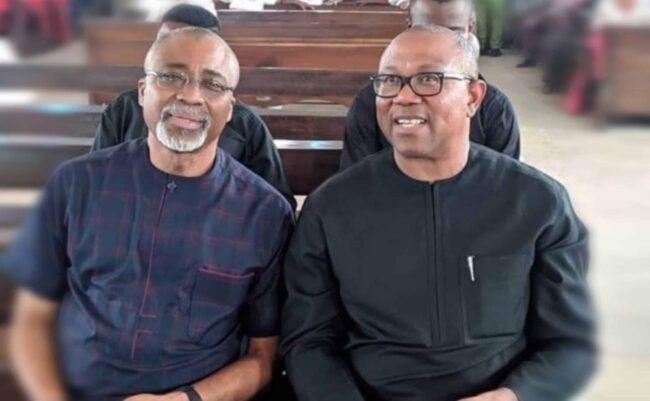In a bold and controversial assessment of Nigeria’s current political landscape, Senator Enyinnaya Abaribe has claimed that the nation would be experiencing superior governance had Peter Obi emerged victorious in the 2023 presidential election. The Abia South Senator’s remarks, delivered during an appearance on Channels Television’s “Politics Today,” have reignited debate about the direction of President Bola Tinubu’s administration and what might have been under alternative leadership.
Speaking with characteristic frankness, Abaribe specifically targeted what he describes as entrenched nepotism in the current administration, arguing that such practices would have been absent under Obi’s leadership. The Senator’s criticism gained particular weight as he pointed to concrete examples, notably questioning Tinubu’s appointment of four ministers from Ogun State while other states received significantly less representation.
According to Abaribe, the current administration’s approach to appointments represents not merely a continuation but an intensification of problematic practices from previous governments. He suggested that the precedent set during Buhari’s presidency has emboldened the current administration to pursue similar policies with even greater vigor, noting that insufficient criticism of earlier nepotistic practices has contributed to their perpetuation.
The Senator’s assessment extends beyond mere criticism of the current administration to paint a picture of what he believes might have been possible under Obi’s leadership. His comments reflect a growing discourse about missed opportunities and alternative paths for Nigeria’s development, particularly regarding inclusive governance and equitable distribution of national resources.
Addressing the specific concerns of the South-East region, Abaribe advocated for a shift in strategy among his constituents. Rather than waiting for federal recognition or support, he urged the region to focus on self-development and internal cohesion. This call for regional self-reliance comes with a historical perspective, as he noted that only presidents Obasanjo and Jonathan had demonstrated genuine fairness toward the South-East region.
The conversation took an interesting turn when Abaribe addressed recent developments regarding Simon Ekpa, the self-proclaimed Prime Minister of Biafra in exile. The Senator welcomed Ekpa’s arrest in Finland, suggesting it might serve as a wake-up call to those who promote violence in the region while operating from abroad. His comments highlighted the complex relationship between diaspora activism and local realities in the South-East.
Abaribe’s analysis of the region’s security challenges led him to a significant conclusion regarding Nnamdi Kanu’s detention. The Senator posited that releasing Kanu could potentially end much of the violence in the South-East, arguing that those who use Kanu’s name to justify violence would lose their primary justification for such actions.
The Senator’s comprehensive critique of the current administration and his speculative assessment of an Obi presidency reflects deeper concerns about Nigeria’s political trajectory. His comments suggest that the nation’s governance challenges extend beyond mere policy disagreements to fundamental questions about institutional fairness and regional inclusion.
These remarks come at a time of increasing national debate about governance quality and regional equity. The contrast Abaribe draws between current realities and his vision of what might have been under Obi’s leadership adds fuel to ongoing discussions about Nigeria’s political future and the path to more inclusive governance.
The Senator’s analysis raises important questions about the relationship between leadership style and national development. His suggestion that Obi’s presidency would have charted a different course for Nigeria, particularly regarding nepotism and regional inclusion, challenges citizens and policymakers to consider alternative approaches to national governance.
As Nigeria continues to grapple with these fundamental issues of governance and national unity, Abaribe’s comments serve as both a critique of current practices and a call for reflection on the nation’s political choices. Whether his assessment of what might have been under different leadership will influence future political discourse remains to be seen, but his words have certainly added to the ongoing debate about Nigeria’s political direction and the qualities needed in its leadership.



